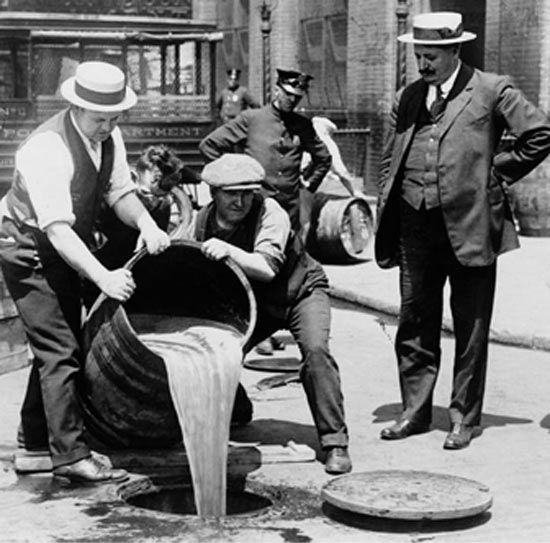![ProhibitionLiquor[1]](http://blogs.friendscentral.org/gcalder/files/2009/04/ProhibitionLiquor1-300x296.jpg)
Philadelphia Inquirer – April 13th, 2009
My students and I were recently discussing Prohibition in our American-history class. The 18th Amendment, ratified in 1919, outlawed the manufacture, sale, transportation, export, and import of “intoxicating liquors.” It remained in force for 15 years.
The students have studied the Constitution in detail, and they know how hard it is to modify it. They wondered how a movement with such broad support that it led to a constitutional amendment could be swept away only a decade and a half later.
One of the students culled articles mentioning Prohibition from newspaper archives of the late Twenties. The articles reported increasingly critical comments about the policy. The most common complaint seemed to be that it simply did not work. People kept on drinking. And, in a perfect illustration of the law of unintended consequences, it spurred a tremendous expansion of organized crime.
But the students were surprised to find out that what eventually made the repeal of Prohibition possible was not just its complete failure to produce the happier, healthier, better-behaved society its progressive supporters had envisioned. It was the Depression.
The United States was in the middle of the worst economic crisis in its history. The government needed money, and Congress could not afford to pass up the tax revenue that the legal sale of alcohol would generate. The 18th Amendment was repealed by the 21st Amendment in December 1933, less than a year into Franklin D. Roosevelt’s first term.
This led the students to another important insight: What they had thought were essentially moral arguments could quite rapidly become economic ones. We turned to the current reporting on the debate over the “war on drugs” and legalization. The anecdotal evidence suggested a noticeable recent increase in the number of mentions of these topics in newspaper articles and editorials, including an op-ed piece they read in The Inquirer this month, headlined “‘War on Drugs’ seems lost.”
The students were particularly struck by the fact that one of the questions asked of President Obama in a recent online Q-and-A session concerned whether legalizing marijuana would have a positive impact on the economy. In particular, they noticed that the question was phrased in economic terms. The argument is shifting from the moral to the fiscal, just as it did in the 1930s.
I presented the students with another recent article on what they initially assumed was an unrelated topic: the death penalty. For the last several years, the capital-punishment debate has centered on DNA evidence revealing that a disturbingly large number of death-row inmates had been wrongly convicted.
The argument of death-penalty opponents was moral: How could we justify maintaining a system that we knew was taking innocent lives? This argument had persuaded many to reconsider the death penalty. But discussions about ending capital punishment in some states have become much more serious in recent months. Why? Because the economic argument has suddenly taken center stage.
Studies have long shown that it is more expensive to administer the death penalty than it is to keep prisoners incarcerated for life. And states, faced with shrinking tax bases, are desperate to cut costs. The economic crisis of the moment is leading us to reconsider some of our priorities, and this phenomenon cuts across political philosophies and party lines. Many (though far from all) who want to abolish the death penalty would describe themselves as liberals. Interestingly, the economic argument may end up drawing more conservative support for this cause. On the other hand, some of the most thoughtful opponents of the “war on drugs” are conservatives. Here, the economic argument may convince more liberals. Just as in the 1930s, my students have noticed, modern debates across the political and social spectrum are being significantly reshaped by the economy.


Picked up your website via google the other day and absolutely liked it so much. Carry on the truly great work.